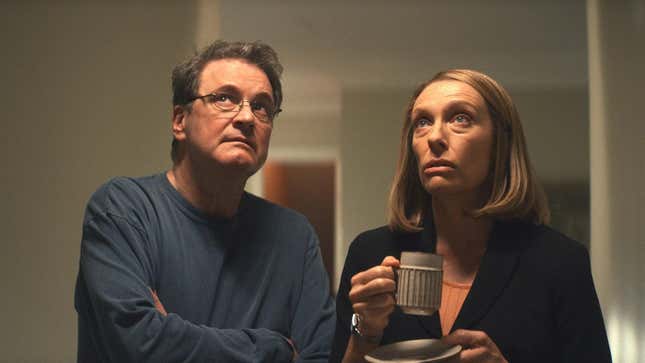HBO Max’s ‘The Staircase’ Asks: ‘Can You Actually Ever Fully Know Something?’
We talked to the series' co-showrunner Maggie Cohn about everything from that memorable sex scene to the controversy around the show.
EntertainmentTV

The Staircase’s titular stairwell is an unusual one—narrow as a doorway, and with an abrupt turn just a few steps from the ground. The creators of the HBO Max series built three copies of it: a green one for stunts, a clean one, and a version covered in fake blood splatter. The real-life home in Durham, North Carolina, where Kathleen Atwater Peterson died at the bottom of her back stairs in 2001, was up for sale while the show was under production, and members of the creative team were allowed to enter the home and take measurements.
The goal in crafting the set—and the whole series, says co-showrunner and executive producer Maggie Cohn—was never to create a work identical to reality. “We’re not replicating something. We’re not adapting. This isn’t ‘based on,’ this is an ‘inspired by,’” she told me over Zoom. “And then we’re very much extrapolating from there.” The “one thing” in the home that they did want to perfectly reproduce, however, Cohn says, was the staircase. Getting it exactly right proved a struggle.
“To the extent that we know things to be true, numbers typically don’t lie,” Cohn says, but, “You give the measurements to somebody, it’s almost like a game of telephone.”
It was a challenge perfectly in keeping with the limited series’s approach to the famous but still-unsettled story of Peterson’s death. The truth is out of reach—just take a look at the debates still raging among the internet sleuths on the Reddit page devoted to the case—and difficult to perfectly replicate, just like that stairwell. “It was another indication that even when you know what the thing is supposed to be, it becomes something else, even if it’s just minutely,” Cohn says. “It just came back to this thesis of, ‘There is no truth, and there is no objectivity.’”
The Staircase, which has garnered Emmys buzz and critical acclaim for its eight-episode run, released its final episode on Thursday. The series, which was created by The Devil All the Time director Antonio Campos and stars Toni Collette and Colin Firth as Kathleen and her husband Michael Peterson, is inspired by the 13-part documentary series of the same name, which was directed by French filmmaker Jean-Xavier de Lestrade and released between 2004 and 2018. It followed the legal saga that unfurled in the wake of Peterson’s death. Despite arguing in court that Kathleen’s death was accidental, Michael was convicted of her murder in 2003. The sentence was overturned in 2011 after a judge found that a forensic analyst had given false testimony, and Peterson eventually accepted an Alford plea.
The documentary’s success would help create the genre of serialized true crime that’s since become omnipresent—a mixture of reportage and techniques from fiction, like cliffhangers and well-executed surprise twists. Now, the documentary that helped create the now-familiar genre has inspired a show that interrogates some of its often black-and-white treatment of truth, justice, and the dead women at the center of the tales.
“I think what is really compelling about The Staircase is that it’s like true crime, [but] we don’t know if it’s a crime, and we really want to investigate the idea of truth,” says Cohn.
In a story full of uncertainty, there’s no figure less knowable than Kathleen, who’s now been dead for more than 20 years. But The Staircase’s depiction of her as a fleshed-out person has been one of the show’s most praised elements and gives the series not only that rare of TV character—a potentially victimized woman who’s not just a flat plot device—but also an emotional core. “In order to have a true loss,” Cohn says, “you have to know what you’re losing.”
Embodied by Collette, who has perfected portrayals of maternal and domestic angst, the series creates a vision of Peterson sketched in the negative space left by her absence. “If Kathleen had not been who she was, her death would not have had the impact it did. And so when you look at the impact her absence had, you begin to realize who she is,” Cohn says. “Further, you get to talk to people, and regardless of what you one thinks happened that night, if there is a universal truth to this, it was that she was, by all accounts, a very dynamic and vibrant individual.”
-

-

-

-

-

-

-

-

-

-

-

-

-

-

-

-

-

-

-

-

-

-

-

-

-

-

-

-

-

-

-

-

-

-

-

-

-

-

-

-








































